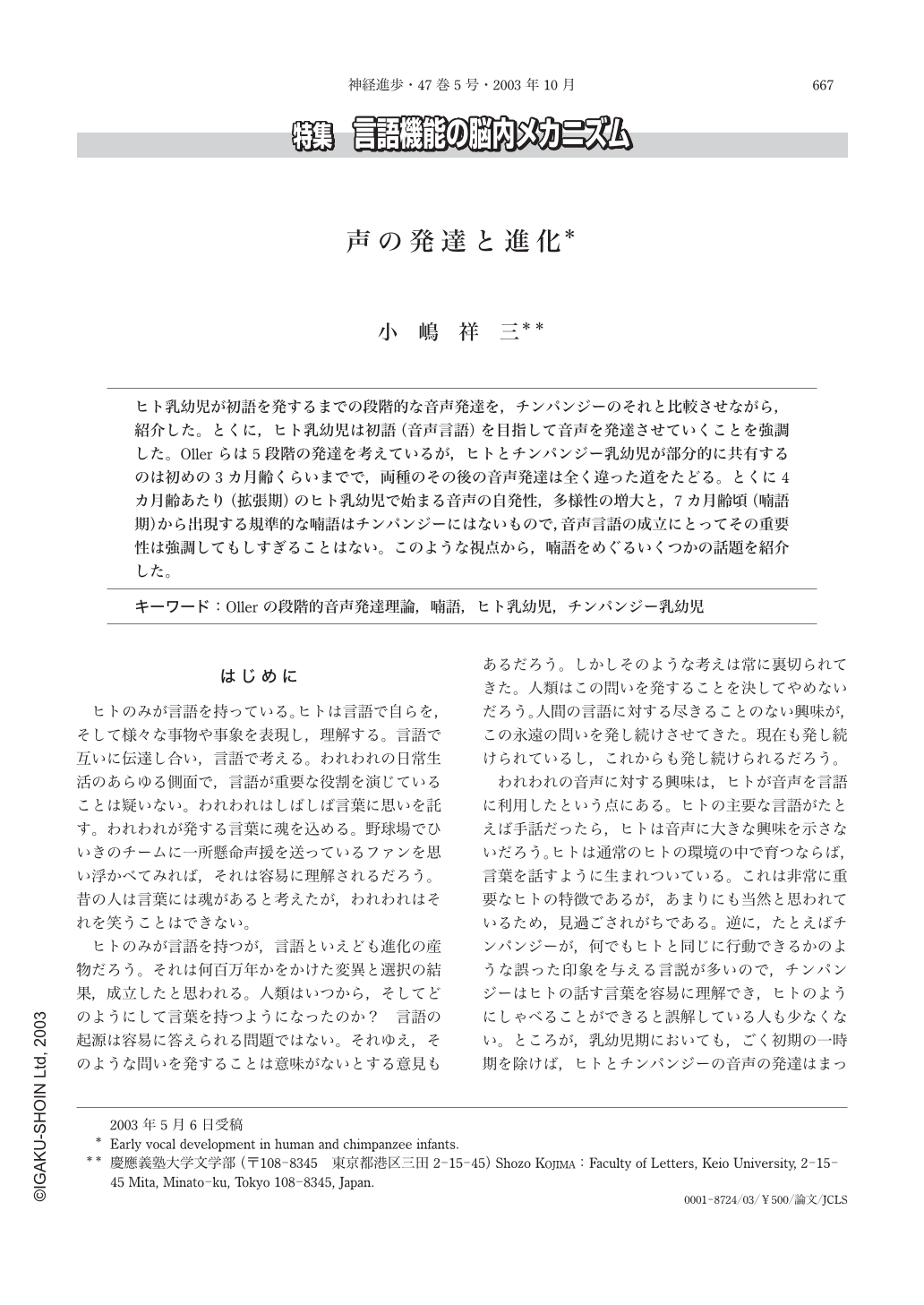Japanese
English
- 有料閲覧
- Abstract 文献概要
- 1ページ目 Look Inside
ヒト乳幼児が初語を発するまでの段階的な音声発達を,チンパンジーのそれと比較させながら,紹介した。とくに,ヒト乳幼児は初語(音声言語)を目指して音声を発達させていくことを強調した。Ollerらは5段階の発達を考えているが,ヒトとチンパンジー乳幼児が部分的に共有するのは初めの3カ月齢くらいまでで,両種のその後の音声発達は全く違った道をたどる。とくに4カ月齢あたり(拡張期)のヒト乳幼児で始まる音声の自発性,多様性の増大と,7カ月齢頃(喃語期)から出現する規準的な喃語はチンパンジーにはないもので,音声言語の成立にとってその重要性は強調してもしすぎることはない。このような視点から,喃語をめぐるいくつかの話題を紹介した。
はじめに
ヒトのみが言語を持っている。ヒトは言語で自らを,そして様々な事物や事象を表現し,理解する。言語で互いに伝達し合い,言語で考える。われわれの日常生活のあらゆる側面で,言語が重要な役割を演じていることは疑いない。われわれはしばしば言葉に思いを託す。われわれが発する言葉に魂を込める。野球場でひいきのチームに一所懸命声援を送っているファンを思い浮かべてみれば,それは容易に理解されるだろう。昔の人は言葉には魂があると考えたが,われわれはそれを笑うことはできない。
ヒトのみが言語を持つが,言語といえども進化の産物だろう。それは何百万年かをかけた変異と選択の結果,成立したと思われる。人類はいつから,そしてどのようにして言葉を持つようになったのか? 言語の起源は容易に答えられる問題ではない。それゆえ,そのような問いを発することは意味がないとする意見もあるだろう。しかしそのような考えは常に裏切られてきた。人類はこの問いを発することを決してやめないだろう。人間の言語に対する尽きることのない興味が,この永遠の問いを発し続けさせてきた。現在も発し続けられているし,これからも発し続けられるだろう。
われわれの音声に対する興味は,ヒトが音声を言語に利用したという点にある。ヒトの主要な言語がたとえば手話だったら,ヒトは音声に大きな興味を示さないだろう。ヒトは通常のヒトの環境の中で育つならば,言葉を話すように生まれついている。これは非常に重要なヒトの特徴であるが,あまりにも当然と思われているため,見過ごされがちである。逆に,たとえばチンパンジーが,何でもヒトと同じに行動できるかのような誤った印象を与える言説が多いので,チンパンジーはヒトの話す言葉を容易に理解でき,ヒトのようにしゃべることができると誤解している人も少なくない。ところが,乳幼児期においても,ごく初期の一時期を除けば,ヒトとチンパンジーの音声の発達はまったく違っている。音声言語はヒトをヒトたらしめる特徴なのである。
したがって,ヒト乳幼児の音声は,結果として,段階を踏みつつ音声言語の出現を目指して発達していくようにみえる。かつて,初語の出現はそれまでの音声の発達とは関係しないと考えられたが(Jakobson, 1968),現在はそのように考える研究者はいないだろう。以下にOllerら(Oller, 1980;Oller&Eilers, 1992など)の音声発達についての考えを紹介する。また,音声言語の基盤的な部分の進化を考えるために,ヒトに最も近縁であるチンパンジーの音声発達(Kojima, 2001;2003など)についても述べる。
The early development of vocal behaviors in human infants was described, and was compared with that of chimpanzee infants. The vocal behaviors of human infants develop in stages. At the age of about 1 year, the typical infant acquires the first word of spoken language. Although human infants usually do not utter words during the first year of life, they do develop a capability to produce the kinds of sounds that are found in words during this period. Oller(1980)and Stark(1980)have proposed similar stage theories describing the development of vocal behavior of human infants leading to the first word of spoken language. According to Oller's analyses of non-crying utterances, there are five stages of vocal development in human infants. These stages include Phonation(0-1months of life[mo]), Goo(2-3mo), Expansion(4-6mo), Canonical babbling(7-10mo)and Variegated babbling(11-12mo). There are characteristic non-reflexive vocalization types for each stage. For example, quasi-resonant nuclei in the Phonation stage, Goo in the Goo stage, fully resonant nucleus, raspberry and others in the Expansion stage, canonical babbling in the Canonical stage and variegated babbling and gibberish in the Variegated Babbling stage.
Chimpanzee infants rarely emitted non-crying vocalizations spontaneously. Rather, the vocalizations were almost always elicited by environmental stimuli. A similar time course for the elicitability of vocalization was observed in human and chimpanzee infants. The elicitation of vocal behaviors of human and chimpanzee infants first increased, and then decreased. Thus, this aspect of vocal behavior in the chimpanzee infant and human infants may have a common basis. However, there were differences between the chimpanzee and human infants. Although human infants increased spontaneous vocalizations, the chimpanzee infant rarely vocalized spontaneously.

Copyright © 2003, Igaku-Shoin Ltd. All rights reserved.


